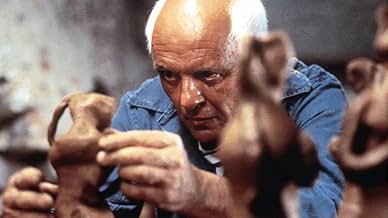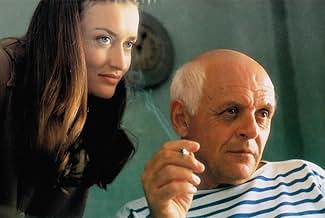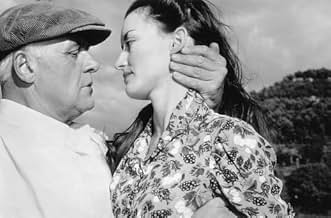AVALIAÇÃO DA IMDb
6,3/10
8,1 mil
SUA AVALIAÇÃO
Relata a história de Françoise Gilot, a única amante de Pablo Picasso que foi forte demais para resistir à sua crueldade e seguir com sua vida.Relata a história de Françoise Gilot, a única amante de Pablo Picasso que foi forte demais para resistir à sua crueldade e seguir com sua vida.Relata a história de Françoise Gilot, a única amante de Pablo Picasso que foi forte demais para resistir à sua crueldade e seguir com sua vida.
- Direção
- Roteiristas
- Artistas
Allegra Di Carpegna
- Geneviève
- (as Allegra di Carpegna)
- Direção
- Roteiristas
- Elenco e equipe completos
- Produção, bilheteria e muito mais no IMDbPro
Avaliações em destaque
The movie is about Francoise Gilot, not about Picasso. It is not intended to tell Picasso's story. Picasso was brilliant, spectacular, the living center of the world of art and a sexual magnet. Women wanted him and, king that he was, Picasso viewed their adoration as no more than his due.
Francoise Gilot, a talented painter in her own right - but no Picasso - lives for ten years a life which for her is absolutely worth the pain. And when the pain is so grave that she will surely be overwhelmed, she stands up and leaves. The pain doesn't go away instantly, but it does go away, in time.
In one memorable scene, Gilot, at home with the baby, questions Picasso's absences, his obvious womanizing. He tells her in no uncertain terms that he will do as he chooses, that his life outside their home is none of her business. She has no right to question him. He doesn't say, "Take it or leave it," but that is the unmistakable message. She takes it, for a few more years, and another child.
It would be interesting to know whether Gilot, who was born in 1921 and is apparently still with us, harbors regret. I cannot imagine that she does. Of course she would have enjoyed that ten years better if Picasso had been able to love, in some recognizable way. But would she trade that life for one less magnificent? For one that would not be a good movie? Hardly.
The acting is of course perfect. Anthony Hopkins becomes the man Picasso. Natascha McElhone, Julianne Moore and Susanna Harker tell us the truth. Well paced, finely directed, this movie tells a riveting story. It is very, very good.
It is perhaps worthy of note that many of the negative reviews of this movie are written by men. Picasso was not just difficult; he was a Difficult Man.
Francoise Gilot, a talented painter in her own right - but no Picasso - lives for ten years a life which for her is absolutely worth the pain. And when the pain is so grave that she will surely be overwhelmed, she stands up and leaves. The pain doesn't go away instantly, but it does go away, in time.
In one memorable scene, Gilot, at home with the baby, questions Picasso's absences, his obvious womanizing. He tells her in no uncertain terms that he will do as he chooses, that his life outside their home is none of her business. She has no right to question him. He doesn't say, "Take it or leave it," but that is the unmistakable message. She takes it, for a few more years, and another child.
It would be interesting to know whether Gilot, who was born in 1921 and is apparently still with us, harbors regret. I cannot imagine that she does. Of course she would have enjoyed that ten years better if Picasso had been able to love, in some recognizable way. But would she trade that life for one less magnificent? For one that would not be a good movie? Hardly.
The acting is of course perfect. Anthony Hopkins becomes the man Picasso. Natascha McElhone, Julianne Moore and Susanna Harker tell us the truth. Well paced, finely directed, this movie tells a riveting story. It is very, very good.
It is perhaps worthy of note that many of the negative reviews of this movie are written by men. Picasso was not just difficult; he was a Difficult Man.
As far as context goes, I had already known most of the material from biographies in other sources. There were only a couple new aspects to this one. The acting was superb. Anthony Hopkins and Natascha McElhone were passionate and believable. It portrays Picasso's nature as narrated by one of his former lovers. It's NOT a fluff piece, but you shouldn't end up hating him unless you did already.
Anthony Hopkins is a very gifted actor,nobody can deny,but ,he was beginning to do any job going:playing Hannibal,Nixon and Picasso,it's much ,too much !Besides,James Ivory 's majestic talent ("Howards end" "remains of the day" "A room with the view" "Maurice") had inexorably waned."Jefferson in Paris" was already unsatisfying,smug and overblown.Still,it was entertaining."Surviving Picasso' is not.Only five minutes -let's be generous- are given over to the process of creation.The essential revolves around Picasso's relationship with women;this is neither rewarding nor entertaining,being trite,hollow and devoid of emotion , violence or/and tenderness.
Word to the wise:people interested in Picasso's art -which is more interesting than his private life!who cares?- should try to see Henri-Georges Clouzot 's "le mystère Picasso" (1956):Unlike Ivory,Clouzot films the REAL Picasso while he is creating.He paints on a sheet of glass and we can follow every lick of paint.
Word to the wise:people interested in Picasso's art -which is more interesting than his private life!who cares?- should try to see Henri-Georges Clouzot 's "le mystère Picasso" (1956):Unlike Ivory,Clouzot films the REAL Picasso while he is creating.He paints on a sheet of glass and we can follow every lick of paint.
Period drama masters Merchant Ivory tackle one of Spain's most iconic artists, or rather, his love life. Francoise Gilot (Natascha McElhone) becomes eloped with the eccentric painter (Anthony Hopkins) during WW2, and the film follows the highs and lows of said relationship as she goes from wide eyed girl to lover to mother of the hot blooded artist's kids.
James Ivory's biopic of Picasso's premiere mistress does have good performances, even if the usually great Hopkins, disappointingly, never fully transforms into the legendary painter and so instead, the film ends up being carried by McElhone as a sympathetic yet ultimately frustrated and abused woman. There are also some welcome moments of humour, usually via Picasso's rather upfront comments & observations about others, and even some inventive flashback sequences that take on Picasso-esque aesthetics with very Cubist rooms and characters.
However, the screenplay never really explores why Gilot or the other women are drawn to and stay with Picasso, despite his duplicitous nature and often angry temperament. The film paints him (hah) as a genius, but also as kind of shameless and a bit of a manbaby, but the why, fame aside, is never looked at in any meaningful way. It's very much the token 'well, it happened in real life, so it's here' card of lazy biopics. Hopkins being given a two-dimensional Picasso doesn't help.
Furthermore, Picasso's art never gets much attention nor examination, missing a great opportunity for parallels and psychological exploration of our leads. This is an unbelievable blunder if you're going to even bother making a film on the man in the first place, as there's a lot of rich subtext to mine and would've helped with defining more of Picasso and his appeal.
Unless you're a Merchant ivory completionist, stick with Remains of The Day.
James Ivory's biopic of Picasso's premiere mistress does have good performances, even if the usually great Hopkins, disappointingly, never fully transforms into the legendary painter and so instead, the film ends up being carried by McElhone as a sympathetic yet ultimately frustrated and abused woman. There are also some welcome moments of humour, usually via Picasso's rather upfront comments & observations about others, and even some inventive flashback sequences that take on Picasso-esque aesthetics with very Cubist rooms and characters.
However, the screenplay never really explores why Gilot or the other women are drawn to and stay with Picasso, despite his duplicitous nature and often angry temperament. The film paints him (hah) as a genius, but also as kind of shameless and a bit of a manbaby, but the why, fame aside, is never looked at in any meaningful way. It's very much the token 'well, it happened in real life, so it's here' card of lazy biopics. Hopkins being given a two-dimensional Picasso doesn't help.
Furthermore, Picasso's art never gets much attention nor examination, missing a great opportunity for parallels and psychological exploration of our leads. This is an unbelievable blunder if you're going to even bother making a film on the man in the first place, as there's a lot of rich subtext to mine and would've helped with defining more of Picasso and his appeal.
Unless you're a Merchant ivory completionist, stick with Remains of The Day.
It's a pity that many of the user comments on this movie are simply a vehicle for people's dislike of Picasso, and that they treat the film as though it were a documentary. Picasso may have been as sex-mad, egocentric, paranoid and capricious as any Hollywood star (think Chaplin); but first and foremost he was a prodigious artist, who transformed our view of visual art, and dealt with some of the great themes of western culture. And presumably it was those latter qualities which drew women to him, in the same way that women have been drawn to successful, powerful men of dubious character since the dawn of time.
The movie and Hopkins' performance are certainly successful in displaying Picasso's human weaknesses; but there is a failure to adequately convey Picasso's enormous creative power, a weakness compounded by the fact that the makers were not allowed to use much of his work in the film. I see the film as a well made, excellently acted, but partial (in both senses of the word) portrait of the artist. Its real focus is the women in his life, especially Francoise Gilot, and on the two-way exploitative nature of the relationship between a man of this kind and his mistresses/wives.
The movie and Hopkins' performance are certainly successful in displaying Picasso's human weaknesses; but there is a failure to adequately convey Picasso's enormous creative power, a weakness compounded by the fact that the makers were not allowed to use much of his work in the film. I see the film as a well made, excellently acted, but partial (in both senses of the word) portrait of the artist. Its real focus is the women in his life, especially Francoise Gilot, and on the two-way exploitative nature of the relationship between a man of this kind and his mistresses/wives.
Você sabia?
- CuriosidadesA few years after this movie, Sir Anthony Hopkins had already signed on to play Hannibal Lecter in Hannibal (2001), but Jodie Foster had declined. When director Ridley Scott let Hopkins know what actresses were being considered to play Clarice, Hopkins remembered how much he enjoyed working with Julianne Moore on this movie, and recommended her.
- Citações
Pablo Picasso: I really like intelligent women. Sometimes, of course, I like stupid ones too.
Principais escolhas
Faça login para avaliar e ver a lista de recomendações personalizadas
- How long is Surviving Picasso?Fornecido pela Alexa
Detalhes
- Data de lançamento
- País de origem
- Centrais de atendimento oficiais
- Idioma
- Também conhecido como
- Surviving Picasso
- Locações de filme
- Empresas de produção
- Consulte mais créditos da empresa na IMDbPro
Bilheteria
- Orçamento
- US$ 16.000.000 (estimativa)
- Faturamento bruto nos EUA e Canadá
- US$ 2.021.348
- Fim de semana de estreia nos EUA e Canadá
- US$ 87.054
- 22 de set. de 1996
- Faturamento bruto mundial
- US$ 2.021.348
- Tempo de duração
- 2 h 5 min(125 min)
- Mixagem de som
- Proporção
- 1.85 : 1
Contribua para esta página
Sugerir uma alteração ou adicionar conteúdo ausente




































